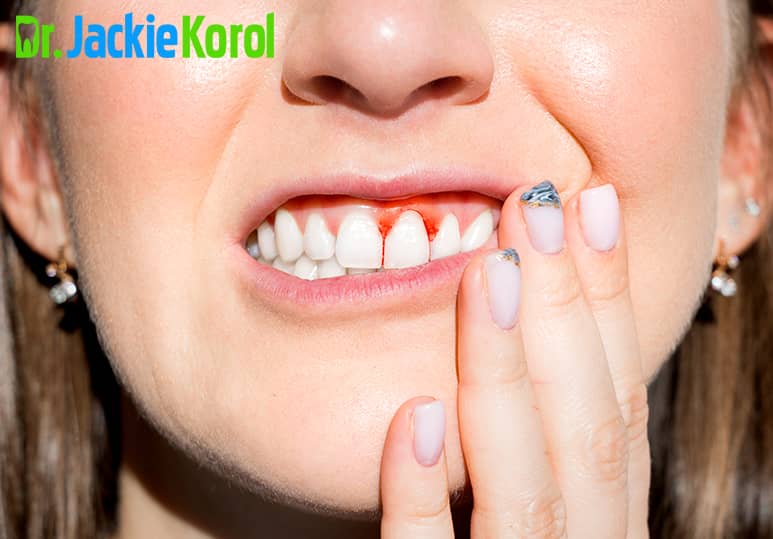Gum Disease Awareness Month: Gum Disease 101

Your mouth can reveal a lot about your overall health. The mouth is one of the first places to reveal the presence of many illnesses including diabetes. A mouth with healthy gums, strong teeth, and a clean tongue and fresh breath is often a good indication of overall oral health. It is important to maintain a healthy mouth to prevent gum disease and other oral health problems that can eventually affect your overall health. Maintaining a good brushing and flossing schedule and making regular visits to your dentist for exams and cleanings will help ensure you have a healthy smile while avoiding gum disease. One of the most common oral health problems is periodontal disease (gum disease) that is preventable through good dental practices such as regular brushing and flossing and is easily treated if detected early. This article will discuss everything you need to know about periodontal disease and how you can prevent it from happening to you.
What Causes Gum Disease?
Periodontal disease, also commonly known as gum disease, is an infection in the gums that surround the teeth. Periodontal disease includes infections in the gums, the cementum that covers the root of each tooth, and the periodontal ligament and alveolar bone. The early stages of periodontal disease are referred to as gingivitis where the infection only affects the gums. In more severe cases, the supporting tissue and bone mentioned above are also infected. Gum disease is caused by a build up of plaque that hardens into tartar unless removed during regular cleanings by your dentist. The build up of plaque and tartar is a perfect environment for bacteria to fester in and eventually infect the tissue and bone surrounding and supporting your teeth.
Symptoms Of Gum Disease
The best way to diagnose periodontal disease or gingivitis is to have a dental exam. Periodontal disease can develop slowly, therefore it is extremely important to take notice of early signs and symptoms. Common signs and symptoms of gum disease include:
- Bleeding gums before and after brushing your teeth
- Swollen, tender, and inflamed gums
- Receding gums
- Persistent bad breath
- Sensitive teeth
- Deep pockets between teeth and gums
How To Prevent Gum Disease
Preventing gum disease is all about taking good care of your oral health. This will include:
- Brushing your teeth, gums, and tongue twice daily
- Flossing at least once per day
- Rinsing your mouth out with antibacterial mouthwash twice daily
- Attending regular dental exams and cleanings
Treatments For Gum Disease
If your dentist determines that you have periodontal disease or gingivitis, they will work with you to develop a treatment plan based on the severity of your gum disease. The goal of gum disease treatments is to promote gum reattachment to your teeth, reduce the depth of pockets between teeth, reduce swelling, and decrease the risk of future infection. Treatments for the disease range from non-surgical therapies that control bacterial growth to surgery to restore supportive tissue.
Dental Exams And Cleanings Calgary
Gum disease is completely preventable. As long as you are diligent about your oral health and regularly brush and floss your teeth daily, you will be at reduced risk of developing the disease. Remember to visit your dentist once every six months as they will be able to detect early signs of gum disease during an exam; perhaps even before you notice any symptoms. The earlier you can detect the disease, the easier and less invasive it will be to treat it.
Dr. Korol Dental is a leading holistic and biocompatible dental practice in Calgary that offers dental cleanings, emergency dentistry, and more. Dr. Korol has the experience and expertise to evaluate your teeth as well as determine if you are at risk of developing gum disease. If you do suffer from gum disease, Dr.Korol will be able to develop a personalized treatment plan to help you regain a healthy, comfortable smile. To learn more about gum disease or if you wish to book a dental exam and cleaning, contact our clinic by calling 1-403-245-9099, or by filling out our online contact form.
FAQ
Q: How often should I visit the dentist for a dental cleaning?
A: The Canadian Association of Dentistry recommends patients visit their dentist once every six months.
Q: Is gum disease painful?
A: The early stages of gum disease usually do not cause pain and many people delay treatment. If not treated in the early stages, gum disease can cause more serious problems with gum tissue and can cause discomfort, sensitivity, and pain.
Q: Can gum disease affect everyone of all ages?
A: Gum disease can affect any and all age groups.
CONTACT US
Questions? Comments? Call us today at 1-403-245-9099 or fill out the form below:


